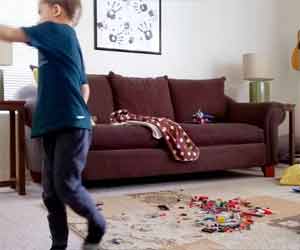- Home
- Editorial
- News
- Practice Guidelines
- Anesthesiology Guidelines
- Cancer Guidelines
- Cardiac Sciences Guidelines
- Critical Care Guidelines
- Dentistry Guidelines
- Dermatology Guidelines
- Diabetes and Endo Guidelines
- Diagnostics Guidelines
- ENT Guidelines
- Featured Practice Guidelines
- Gastroenterology Guidelines
- Geriatrics Guidelines
- Medicine Guidelines
- Nephrology Guidelines
- Neurosciences Guidelines
- Obs and Gynae Guidelines
- Ophthalmology Guidelines
- Orthopaedics Guidelines
- Paediatrics Guidelines
- Psychiatry Guidelines
- Pulmonology Guidelines
- Radiology Guidelines
- Surgery Guidelines
- Urology Guidelines
Chaotic household adversely impacts asthma control in children

Illinois: Tumult in the household may be the cause for poor control of asthma among children, according to a study published recently in the journal Pediatrics.
The study found that chaos or complete disorder and confusion in the house whereby things do not run smoothly, relaxation is difficult, child and parent in depression and work do not get completed in a timely manner -- is linked to worse asthma outcomes in urban minority children.
Asthma is a frequent chronic disease among children, with particularly high rates among poor and minority youth. Though previous studies have linked psychosocial factors to asthma severity the association remains poorly understood. Sally M. Weinstein, associate professor of clinical psychiatry in the University of Illinois at Chicago College of Medicine, and colleagues examined:
- relationships between parent and child depression and posttraumatic stress disorder (PTSD) symptoms, family functioning, and child asthma control in a sample of urban minority youth with uncontrolled asthma; and
- family functioning as a pathway linking parent depression and asthma outcomes.
“Higher levels of chaos – lack of organization or set routines, among other things – seems to be a pathway linking parental depression and worse child asthma control,” said Weinstein.
For the study, the researchers chalked out data from the baseline cohort of a randomized trial testing community interventions for 223 children aged 5 to 16 with uncontrolled asthma, of which 85.2% were Hispanic and one of their parents. Asthma Control Test and Childhood Asthma Control Test, activity limitation, and previous-12-month asthma severity were used to define asthma control. Psychosocial measures included parent and child depression and PTSD symptoms, family chaos, and parent social support.
Key findings of the study include:
- Parent and child depression symptoms, but not PTSD, were associated with worse asthma control.
- Family chaos corresponded to worse asthma control, even when controlling for parent and child depression, and was a mediator of the parent depression-asthma path.
- Emotional triggers of asthma also mediated the parent depression-asthma relationship.
Family chaos was evaluated using a 15-item questionnaire that asked respondents to rate statements such as “No matter how hard we try, we always seem to be running late;” “We can usually find things when we need them;” “We always seem to be rushed;” and “Our home is a good place to relax.”
The researchers found that family chaos explained part of how parent depression affected child asthma control.
“When a parent is depressed, it’s harder to keep the family routines running smoothly, and it’s also harder to manage the daily demands of caring for their child’s asthma, which can require multiple medications and avoidance of triggers,” said Weinstein, who is also associate director of the University of Illinois Center on Depression and Resilience. “We saw that in families with greater household chaos, child asthma control tended to be worse.”
"Findings highlight family chaos as a mechanism underlying the relationship between parent depression and child asthma control. Addressing parent and child depression, family routines, and predictability may optimize asthma outcomes," concluded the authors.
To read the complete study log on to doi: 10.1542/peds.2018-2758

Disclaimer: This site is primarily intended for healthcare professionals. Any content/information on this website does not replace the advice of medical and/or health professionals and should not be construed as medical/diagnostic advice/endorsement or prescription. Use of this site is subject to our terms of use, privacy policy, advertisement policy. © 2020 Minerva Medical Treatment Pvt Ltd